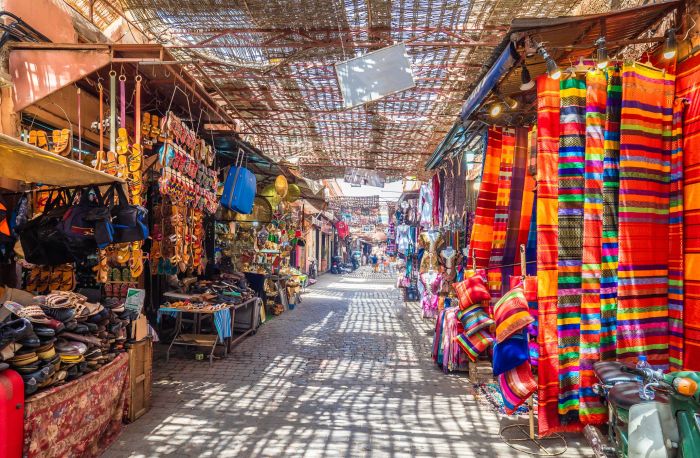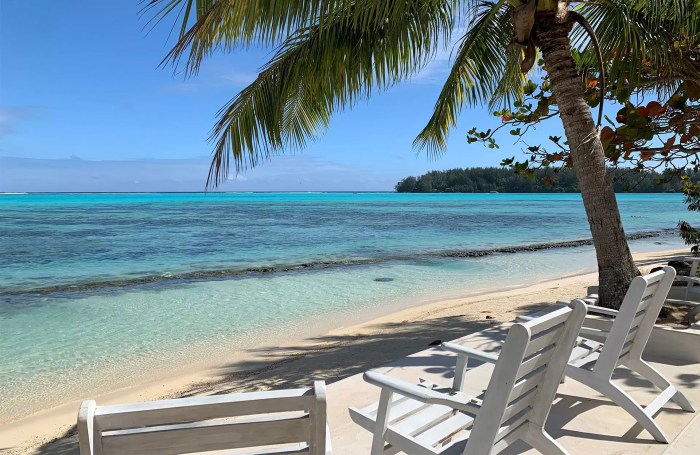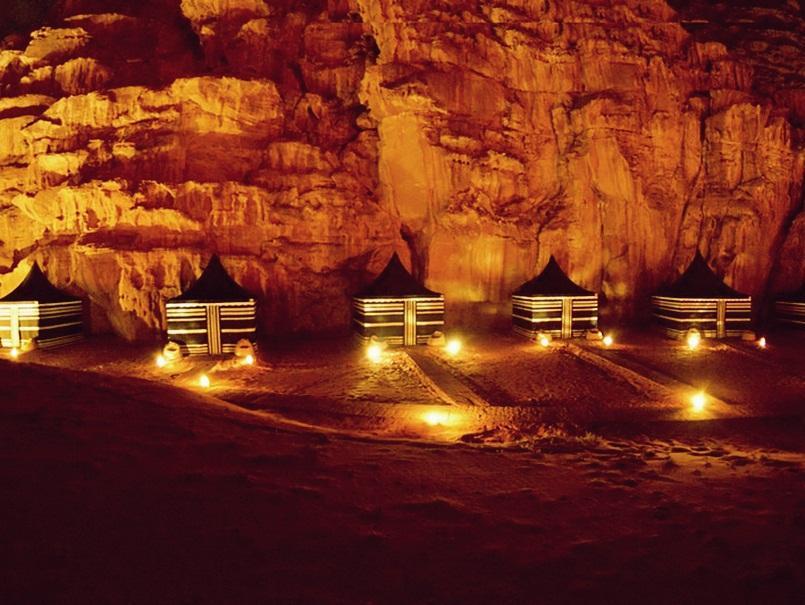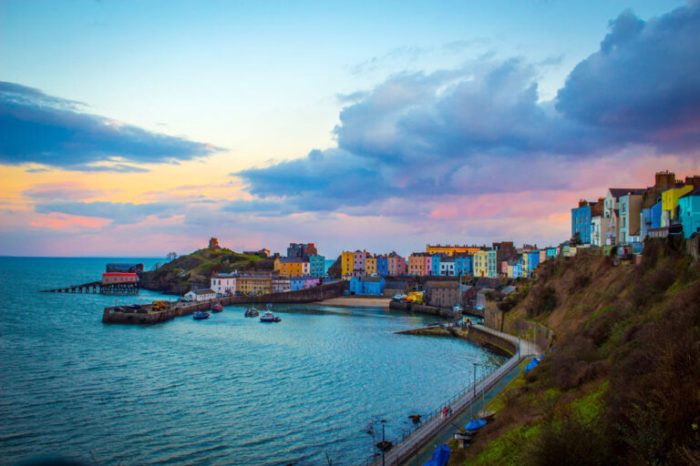Morocco markets – Morocco’s markets present a dynamic and growing landscape for businesses, offering both opportunities and challenges. With its strategic location, diverse economy, and increasing consumer spending, Morocco has emerged as an attractive destination for investors and entrepreneurs.
This comprehensive guide provides an in-depth analysis of Morocco’s market, covering key segments, economic indicators, political factors, consumer trends, and investment opportunities. By understanding the intricacies of this vibrant market, businesses can develop effective strategies for success.
Market Overview
Morocco’s market presents a significant growth opportunity, characterized by a diverse and expanding consumer base. The country’s strategic location as a gateway to Africa and Europe, coupled with its political stability and economic reforms, has positioned it as an attractive investment destination.
Key market segments include consumer goods, retail, tourism, and infrastructure. The consumer goods market, driven by a growing middle class and rising disposable income, is expected to witness substantial growth in the coming years. The retail sector is also experiencing rapid expansion, with the emergence of modern shopping malls and e-commerce platforms.
Morocco’s tourism industry, renowned for its cultural heritage and natural attractions, has been a major contributor to the economy and is poised for further growth.
Market Size and Growth Potential
- Morocco’s GDP is estimated at $126 billion (2023), with a projected growth rate of 3.5% in 2023 and 4% in 2024.
- The population of Morocco is approximately 37 million, with a median age of 30.7 years.
- The country’s middle class is expanding rapidly, creating a growing demand for consumer goods and services.
- Morocco’s strategic location and investment-friendly policies have attracted significant foreign direct investment (FDI), particularly in the automotive, renewable energy, and tourism sectors.
Economic Landscape
Morocco’s economy is a blend of traditional and modern sectors, with agriculture, tourism, and mining being key industries. The country has experienced steady economic growth in recent years, driven by government reforms and foreign investment.
Factors influencing economic growth and stability include:
Political Stability
- Morocco has a stable political environment, which has fostered investor confidence and encouraged foreign investment.
- The country has a strong legal framework and a commitment to economic liberalization.
Macroeconomic Policies, Morocco markets
- The government has implemented sound macroeconomic policies, including fiscal discipline and a stable monetary policy.
- These policies have helped to control inflation, reduce budget deficits, and maintain a healthy balance of payments.
Diversification of the Economy
- Morocco has been diversifying its economy to reduce its dependence on traditional sectors such as agriculture and tourism.
- The government has invested in new industries, such as manufacturing, automotive, and renewable energy.
Foreign Direct Investment
- Morocco has attracted significant foreign direct investment (FDI) in recent years.
- FDI has played a crucial role in boosting economic growth, creating jobs, and transferring technology.
Challenges
- Despite its progress, Morocco faces several economic challenges, including:
- High unemployment, especially among young people.
- A large informal sector.
- A dependence on imports.
Political Environment
Morocco’s political landscape has a significant impact on business operations and market development. The country has maintained relative political stability, contributing to a favorable environment for economic growth.
The government has implemented various policies and regulations to foster economic development, including:
Investment Promotion
- Offering tax incentives and other benefits to attract foreign direct investment.
- Establishing special economic zones with reduced regulatory burdens and streamlined business processes.
Trade Liberalization
- Signing free trade agreements with several countries, including the European Union.
- Reducing tariffs and other barriers to international trade.
Infrastructure Development
- Investing in infrastructure projects such as roads, ports, and airports to improve connectivity and facilitate trade.
- Developing renewable energy sources to reduce energy dependency and promote sustainable growth.
Consumer Trends
Consumer trends in Morocco are influenced by a blend of cultural and socioeconomic factors. The country’s vibrant cultural heritage, Islamic traditions, and growing middle class have shaped distinct purchasing patterns.
Moroccan consumers place a high value on family, tradition, and community. This is reflected in their spending habits, with a significant portion of income allocated to household essentials, food, and religious observances.
Cultural Influences
Cultural norms play a crucial role in shaping consumer behavior in Morocco. Religious festivals, such as Ramadan and Eid, drive increased spending on food, clothing, and gifts. Traditional clothing, particularly the jellaba and kaftan, remain popular attire for both men and women.
Moroccan consumers are also influenced by the country’s rich culinary traditions. Spices, herbs, and fresh produce are highly valued, and home-cooked meals are a staple of Moroccan cuisine.
Social Factors
Morocco’s growing middle class has fueled a surge in consumer spending. This demographic is characterized by higher disposable income and a desire for modern goods and services.
Education levels are also rising, leading to increased awareness of global trends and a shift towards more sophisticated and technology-driven products.
E-commerce and Technology
The rise of e-commerce and mobile technology has transformed the retail landscape in Morocco. Online marketplaces, such as Jumia and Souq, have made it easier for consumers to access a wider range of products and services.
Mobile penetration is high, with smartphones becoming the primary means of internet access for many Moroccans. This has led to the growth of mobile-based shopping and payments.
Sustainability and Health
Growing awareness of environmental and health issues is influencing consumer choices in Morocco. There is a growing demand for eco-friendly products, organic food, and natural health remedies.
Health concerns, particularly related to chronic diseases, are also driving demand for healthy food options and fitness-related products.
Competitive Landscape
Morocco’s market is characterized by a competitive landscape with a mix of local and international players. These companies compete fiercely for market share, offering a wide range of products and services to meet the diverse needs of consumers.
Among the major players in Morocco’s market are:
- Marjane: A leading hypermarket chain with a strong presence throughout the country.
- Carrefour: A French multinational retailer with a significant presence in Morocco.
- Aswak Assalam: A local supermarket chain with a focus on affordable products.
- BIM: A Turkish discount store chain with a growing presence in Morocco.
- Acima: A Moroccan home appliance and electronics retailer.
Market Share
Marjane holds the largest market share in Morocco’s retail sector, followed by Carrefour. Aswak Assalam and BIM have been gaining market share in recent years, particularly in the value-oriented segment. Acima has a strong presence in the home appliance and electronics market.
Strategies
The major players in Morocco’s market employ a variety of strategies to compete effectively. These include:
- Expansion: Expanding their store network to reach more consumers.
- Product diversification: Offering a wide range of products to meet the diverse needs of consumers.
- Pricing strategies: Offering competitive prices to attract customers.
- Customer service: Providing excellent customer service to build loyalty.
- Online presence: Establishing an online presence to cater to the growing number of online shoppers.
Competitive Advantages
The major players in Morocco’s market have developed various competitive advantages to differentiate themselves from competitors. These include:
- Strong brand recognition: Marjane and Carrefour have strong brand recognition due to their long-standing presence in the market.
- Extensive store network: Marjane and Carrefour have extensive store networks, providing convenient access to consumers.
- Private label products: Marjane and Carrefour offer private label products, which provide customers with affordable options.
- Exclusive partnerships: Acima has exclusive partnerships with major appliance and electronics brands, providing customers with access to a wide range of products.
Distribution Channels
In Morocco, various distribution channels facilitate the flow of goods and services from producers to consumers. Each channel offers unique advantages and challenges, shaping the overall market dynamics.
The primary distribution channels in Morocco include:
Modern Trade
- Supermarkets and Hypermarkets:These large-format stores offer a wide variety of products, including groceries, home appliances, and electronics. They provide a convenient and one-stop shopping experience for consumers.
- Convenience Stores:Smaller than supermarkets, these stores are located in residential areas and offer a limited selection of essential items for quick purchases.
- Specialty Stores:These stores focus on specific product categories, such as electronics, clothing, or home decor. They offer a more curated selection and often provide specialized services.
Traditional Trade
- Souks:Traditional marketplaces where vendors sell a wide range of products, from fresh produce to handicrafts. Souks offer a unique cultural experience but can be crowded and lack standardized pricing.
- Small Grocery Stores:These neighborhood stores carry a limited selection of basic necessities, including groceries, toiletries, and household items.
- Street Vendors:These vendors operate in public spaces, selling a variety of goods, such as snacks, drinks, and souvenirs. They offer convenience but may lack quality control.
Online Channels
- E-commerce Marketplaces:Platforms like Jumia and Souq.com allow consumers to purchase a wide range of products online. They offer convenience and access to a broader selection but may face challenges with logistics and delivery.
- Brand Websites:Some brands have established their own online stores, enabling consumers to purchase products directly from the source.
Market Access: Morocco Markets
Entering the Moroccan market requires a comprehensive understanding of legal requirements, import regulations, and distribution agreements.
To ensure a smooth entry into the market, it is essential to comply with the following regulations:
Legal Requirements
- Registration with the Moroccan Trade Register (Registre de Commerce)
- Obtaining a tax identification number (Numéro d’Identifiant Fiscal)
- Compliance with labor laws and social security regulations
Import Regulations
- Obtaining import licenses from the Moroccan Customs and Indirect Taxes Administration (Administration des Douanes et Impôts Indirects)
- Declaration of goods at customs and payment of applicable duties and taxes
- Compliance with product safety and labeling standards
Distribution Agreements
- Establishing agreements with local distributors or agents
- Negotiating terms and conditions, including pricing, distribution channels, and sales targets
- Ensuring compliance with local competition laws
Investment Opportunities
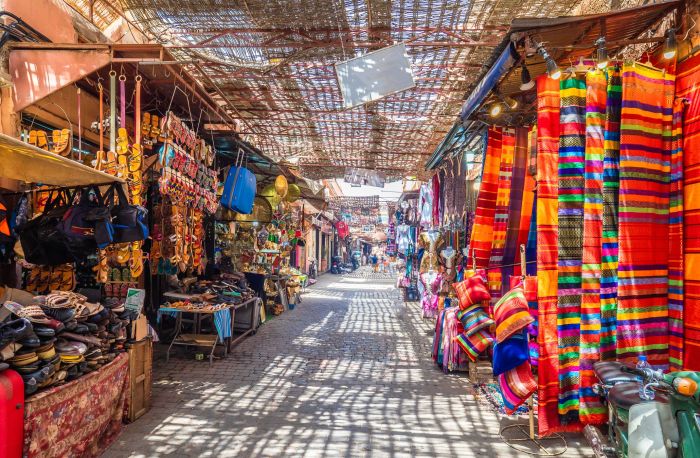
Morocco presents a range of investment opportunities for both domestic and international investors. The country’s strategic location, favorable business climate, and government incentives make it an attractive destination for foreign direct investment.
The government of Morocco has implemented several policies to attract foreign investment, including tax incentives, free trade agreements, and the establishment of special economic zones. These measures have helped to create a favorable environment for investors, and have contributed to the country’s economic growth.
Promising Sectors
- Renewable energy:Morocco has set ambitious targets for renewable energy development, and the government is providing incentives to attract investment in this sector.
- Infrastructure:Morocco is investing heavily in infrastructure development, including roads, railways, ports, and airports. This sector offers opportunities for investors in construction, engineering, and transportation.
- Tourism:Morocco’s tourism sector is a major contributor to the economy, and the government is investing in developing new tourist destinations and improving infrastructure. This sector offers opportunities for investors in hotels, resorts, and other tourism-related businesses.
- Agriculture:Morocco has a strong agricultural sector, and the government is investing in irrigation and other infrastructure to improve productivity. This sector offers opportunities for investors in food processing, distribution, and other agricultural-related businesses.
Risks and Rewards
While Morocco offers a range of investment opportunities, there are also some risks associated with investing in the country. These risks include:
- Political instability:Morocco has a history of political instability, and there is a risk of future unrest. This could lead to disruptions in business operations and economic losses.
- Currency fluctuations:The Moroccan dirham is pegged to the euro, but there is a risk of devaluation if the euro weakens. This could lead to losses for investors who hold Moroccan assets.
- Bureaucracy:Morocco has a complex bureaucracy, and this can make it difficult for businesses to operate efficiently. Investors should be prepared to deal with delays and other challenges when doing business in Morocco.
Despite these risks, Morocco also offers a number of rewards for investors. These rewards include:
- Strong economic growth:Morocco has experienced strong economic growth in recent years, and this is expected to continue in the future.
- Favorable business climate:Morocco has a favorable business climate, with low taxes, a skilled workforce, and a strong legal framework.
- Strategic location:Morocco is located at the crossroads of Europe and Africa, and this gives it access to a large market.
Investors who are considering investing in Morocco should carefully weigh the risks and rewards before making a decision. However, for those who are willing to take on some risk, Morocco offers a number of attractive investment opportunities.
Case Studies
Several businesses have successfully established themselves in Morocco’s market. These companies offer valuable insights into effective strategies and lessons learned for operating in the region.
One notable example is the French retail chain Carrefour, which entered the Moroccan market in 1999. Carrefour has grown to become one of the largest retailers in the country, with over 90 stores and a strong presence in both urban and rural areas.
The company’s success can be attributed to its focus on providing affordable and accessible products, as well as its commitment to local sourcing and partnerships.
Lessons Learned from Carrefour
- Importance of adapting to local market preferences and cultural nuances.
- Value of building strong relationships with local suppliers and distributors.
- Benefits of investing in infrastructure and logistics to ensure efficient distribution.
Future Outlook
Morocco’s market is projected to continue its growth trajectory in the coming years. The country’s stable political environment, growing economy, and young population are all contributing factors to this positive outlook.
Several emerging trends and opportunities are shaping the future of Morocco’s market. These include the rise of e-commerce, the increasing demand for sustainable products, and the growing importance of tourism.
E-commerce
E-commerce is rapidly growing in Morocco, as more and more consumers turn to online shopping for convenience and access to a wider range of products. This trend is expected to continue in the coming years, driven by the increasing penetration of smartphones and internet access.
Sustainability
Consumers in Morocco are becoming increasingly aware of the importance of sustainability. This is driving demand for products that are eco-friendly and socially responsible. Businesses that can meet this demand are well-positioned to succeed in the future.
Exploring the vibrant markets of Morocco is an unforgettable experience, with a plethora of colorful textiles, intricate ceramics, and aromatic spices. For a unique adventure, consider taking a new york to la train to experience the vast landscapes and diverse cultures along the way.
Upon returning to Morocco, immerse yourself in the bustling souks once more, discovering hidden treasures and bargaining for unique souvenirs to cherish.
Tourism
Tourism is a major industry in Morocco, and it is expected to continue to grow in the coming years. The country’s rich history, culture, and natural beauty make it a popular destination for tourists from around the world.
Last Recap
In conclusion, Morocco’s markets offer a promising environment for businesses seeking growth and expansion. With its favorable economic conditions, stable political landscape, and evolving consumer trends, Morocco presents numerous opportunities for investors and entrepreneurs. By navigating the challenges and leveraging the opportunities, businesses can position themselves for success in this dynamic and rewarding market.
FAQ Resource
What are the key drivers of growth in Morocco’s market?
Morocco’s market growth is driven by factors such as increasing consumer spending, government infrastructure investments, and a growing tourism sector.
What are the major challenges facing businesses in Morocco?
Businesses operating in Morocco may encounter challenges related to bureaucracy, corruption, and competition from both local and international players.
What are the most promising sectors for investment in Morocco?
Morocco offers attractive investment opportunities in sectors such as renewable energy, tourism, infrastructure, and manufacturing.
